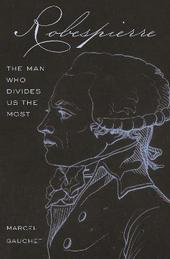
|
Robespierre: The Man Who Divides Us the Most
Hardback
Main Details
| Title |
Robespierre: The Man Who Divides Us the Most
|
| Authors and Contributors |
By (author) Marcel Gauchet
|
|
Translated by Malcolm DeBevoise
|
| Physical Properties |
| Format:Hardback | | Pages:224 | | Dimensions(mm): Height 235,Width 156 |
|
| Category/Genre | Social and political philosophy |
|---|
| ISBN/Barcode |
9780691212944
|
| Classifications | Dewey:944.04092 |
|---|
| Audience | |
|---|
|
Publishing Details |
| Publisher |
Princeton University Press
|
| Imprint |
Princeton University Press
|
| Publication Date |
8 March 2022 |
| Publication Country |
United States
|
Description
How Robespierre's career and legacy embody the dangerous contradictions of democracy. Maximilien Robespierre (1758-1794) is arguably the most controversial and contradictory figure of the French Revolution, inspiring passionate debate like no other protagonist of those dramatic and violent events. The fervor of those who defend Robespierre the 'Incorruptible,' who championed the rights of the people, is met with revulsion by those who condemn him as the bloodthirsty tyrant who sent people to the guillotine. Marcel Gauchet argues that he was both, embodying the glorious achievement of liberty as well as the excesses that culminated in the Terror. In much the same way that 1789 and 1793 symbolise the two opposing faces of the French Revolution, Robespierre's contradictions were the contradictions of the revolution itself. Robespierre was its purest incarnation, neither the defender of liberty who fell victim to the corrupting influence of power nor the tyrant who betrayed the principles of the revolution. Gauchet shows how Robespierre's personal transition from opposition to governance was itself an expression of the tragedy inherent in a revolution whose own prophetic ideals were impossible to implement. This panoramic book tells the story of how the man most associated with the founding of modern French democracy was also the first tyrant of that democracy, and it offers vital lessons for all democracies about the perpetual danger of tyranny. 'A subtle, elegant, and perspicacious explanation of Robespierre's double career, in 1789-91 and 1792-94. It is also a general guide to the history of modern France.' - Patrice Higonnet, Times Literary Supplement
Author Biography
Marcel Gauchet is one of France's preeminent public intellectuals. He is professor emeritus at the Ecole des Hautes Etudes en Sciences Sociales in Paris and the author of many books, including Madness and Democracy: The Modern Psychiatric Universe and The Disenchantment of the World: A Political History of Religion (both Princeton).
Reviews"Epic in scope, Robespierre relates how the man who became an icon of the movement for French democracy also became its first tyrant. Its narrative is a potent, timely warning that the very real danger of tyranny lies within democracy itself." * Foreword Reviews * "The virtue of Gauchet's book is his laser-like focus on the one belief that shaped Robespierre's constantly evolving opinions and actions: that government should reflect the will of the people, but particular interests, often involving conspiracies, stand in the way of the triumph of that general will."---Lynn Hunt, New York Review of Books "It is not so much Robespierre himself who is of interest to Gauchet, but Robespierre as a synecdoche for the revolution...It is to their considerable credit that in their introduction of the book, David A Bell and Hugo Drochon have elucidated the basic contours of Gauchet's long career in their introduction, which will be absolutely indispensable to English readers likely to be less familiar with the polemical intentions behind this book. Indeed, as they themselves note, Robespierre offers perhaps the easiest entry point to Gauchet's work. "---Angus Brown, Tocqueville 21 "Gauchet's recent book, Robespierre: The Man Who Divides Us the Most...comes to us beautifully translated by Malcolm DeBevoise and introduced by David Bell and Hugo Drochon. Robespierre is a lively addition to an already spirited world of French revolutionary biographies. "---Kevin Duong, Perspectives on Politics
|